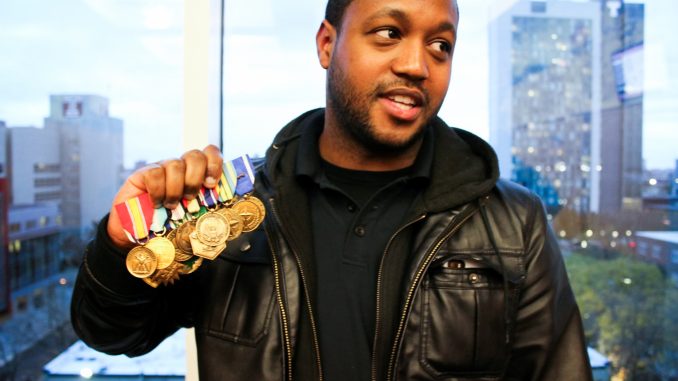
Silas Adams didn’t rest on the day his wisdom teeth were removed. At 18, he continued as if it were any other day in Marine Corps boot camp.
“They were removed early in the morning, and I went right back to doing everything everyone else was doing – running, pushups and pullups,” the now 27-year-old veteran and Temple sophomore said.
Adams is a finance and risk management major. He’s also one of 690 veterans at Temple who are transitioning from a military to college lifestyle. The process is not easy, Adams said, despite Temple recently ranking tied for No. 24 in U.S. News & World Report’s Top 52 “Best Colleges for Veterans.”
“As far as lifestyle and culture, we experience two different ends of the spectrum,” Adams said. “It’s a stark change and it’s not like we’re weaned off the military lifestyle.”
As president of the Temple Veterans Association, Adams reaches out to other Temple veterans in an attempt to smooth the process, which he compares to “being thrown from warm to icy cold water.”
Established in September 2010, the Temple Veterans Association aims to integrate veterans not just professionally, but socially.
“I’ve found that it’s hard to identify with the student culture, so we reach out to each other to establish that missing connection,” Adams said. “We’ve all served to some extent, so that alone gives us a sense of camaraderie or brotherhood.”
Since a young age, Adams said he has been passionate about people coming together for a common reason, regardless of their backgrounds. Growing up in the small town of Bristol, Pa., Adams said he was not always exposed to this type of unity.
“There was a lot of tension in Bristol between people of different backgrounds,” Adams said. “I noticed disparities and how people weighed differences in others.”
Despite this lack of community, several hardships throughout Adams’ youth inspired neighbors to put aside differences, he said. One of those events was 9/11.
“It came [as] a tragedy that made everything else superficial,” he said. “It was the first time in my life that I saw these little differences dissolve and our nation come together to stand for one thing. It was compelling.”
It wasn’t the first time Adams had seen people mature in the face of tragedy. When he was 13, his mother died of a heart attack. Family, friends and teachers flooded his house the night she died.
“A lot of people showed up to console us,” Adams said. “I realized that a family has a lot of gravity in a community, especially a small one.”
Her death left Adams in shock, he said. He recalled returning to school the next day, unable to absorb the surreal situation.
“As a kid, I was always doing things,” Adams said. “Having something to do put me at ease.”
Frances O’Donnell, a friend of Adams’ mother and the woman who became his guardian, said Adams has always pushed himself.
“He was always an overachiever, always wanting to do something,” O’Donnell said.
Adams and O’Donnell formed a close bond. A veteran herself, she recalled the moment after he turned 18 and told her wanted to join the Marine Corps. Her stomach dropped at that moment, she said.
“I was constantly a nervous wreck,” O’Donnell said. “I told him I was a veteran and I knew what he was up against.”
Still, that did not deter him. Adams spent eight years in the Marine Corps.
Adams was constantly on the move during those years, whether he was training in Twentynine Palms, Calif., or deployed near Fallujah, Iraq on a nine-month rotation. At one point, Adams was part of the embassy program through which he guarded Condoleezza Rice and President George W. Bush in conjunction with the Secret Service.
“They herded us like sheep to different locations,” he said of his time in the Marine Corps. “At first, I was on edge. While I wasn’t completely comfortable, I was comfortable to a point where I wasn’t completely drained constantly.”
The challenges faced in combat make it difficult to adapt to the different challenges of college life, Adams said. The perspective he has as a veteran makes certain aspects of college seem trivial. He vividly remembered the day his armored vehicle was blown up in Iraq.
“It felt like someone picked up the back of the truck and flipped it, and all we could do was make sure everyone was OK and look for the cause,” Adams said.
Eventually, Adams worked his way up to sergeant ranking. Experiences along the way, such as the vehicle explosion, are what Adams said forced him to “grow up” in the Marine Corps. The maturity he gained from those eight years made him feel slightly disconnected from students in his classes at Temple, though he said he “could never look down on anyone.”
Adams said he hopes the Temple Veterans Association will better the social aspects of college life for veterans, as well as help them adjust socially and professionally.
He expressed concern about Temple’s lack of a Veteran Affairs office on Main Campus.
“We need that outlet,” he said. “It’s a pivotal piece of communication and attracting more veterans.”
Still, the Temple Veterans Association has been crucial to the transition of many veterans, including sophomore finance major Donald Grant.
“Being able to network through the Veterans Association is a profound tool,” Grant said. “And through socials and happy hours, it’s a way for veterans to reminisce about life in uniform.”
Adams said he wants to keep attracting veterans to the organization.
“At first, I struggled socially to find people I could relate to,” Adams said. “I want to let other veterans know they aren’t alone.”
Claire Sasko can be reached at claire.sasko@temple.edu.


Be the first to comment